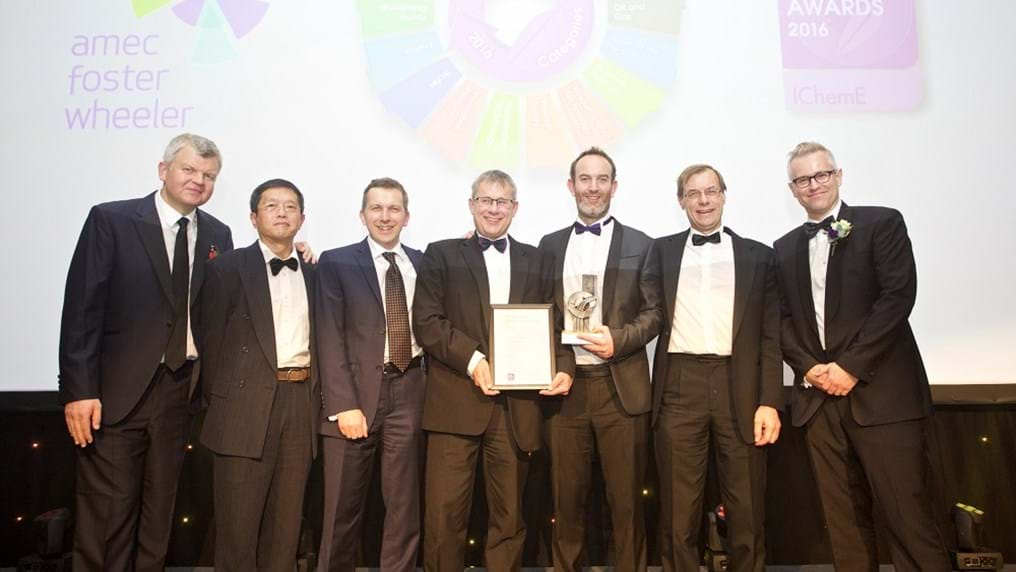Johnson Matthey triumph at IChemE Global Awards

3rd November 2016
Methanol is the simplest form of alcohol and it's used in the manufacture of a wide range of everyday products. In times past it was made in small quantities from wood chipping. Today it is manufactured on an industrial scale from natural gas using a complex catalytic process.
Building on over 20 years of research, Johnson Matthey's process uses a gas heated reformer to save energy, cut costs and deliver a step change reduction in carbon dioxide emissions. It's a world beater and it could be a world saver, and it went home tonight named overall winner at the Institution of Chemical Engineers' (IChemE) Global Awards 2016 in Manchester, UK.
The Johnson Matthey team had triumphed earlier in the evening by seeing off stiff competition from global names including FUJIFILM Diosynth Biotechnologies, Shell and Ferrari to pick up the Chemical Engineering Industry Project of the Year Award. They then went on to win the night’s top Award for Outstanding Achievement in Chemical and Process Engineering.
Over 120 entries made the final stage of the Awards from 21 countries, but it was a particularly successful night for the UK. Sellafield and the UK National Nuclear Laboratory claimed the Process Safety Award for their waste-management programme, which will save the Magnox decommissioning project time and money. ALUSID, a spin-out company from University of Central Lancashire (UCLAN), was awarded Best Business Start-Up. Their chemical engineers have developed ‘SilicaStone’, an architectural substance made from 100% recyclable materials.
Queen’s University Belfast spin-out, Green Lizard Technologies, together with Evonik Industries and FGV Applied Technologies claimed the Food and Drink Award. MOL Plc and University of Pannonia from Hungary scooped the Innovative Product Award for their rubber bitumen which has increased the life-span of roads by almost 50%.
Entries from the USA also topped the winners tally. Folia Water won the Water Award for their ‘Folia Filters’, a lightweight and low-cost paper filter that can provide a village of 500 people with clean water for a year.
Similarly, JustMilk won the Ambani Award for Outstanding Innovation for Resource-Poor People. The company have designed a device that helps breast-feeding mothers to safely deliver medicine to their babies. The novel technology was developed to tackle the high infant mortality rates in low to middle income countries.
Individual winners on the night included BP’s Alex Kelly, who was named Young Chemical Engineer in Industry. He faced tough competition from Singapore winner, Procter & Gamble’s Betty Tsai, and diversity champion Mark McBride-Wright from KBR.
Timothy Gordon Walmsley was awarded the Young Chemical Engineer in Research accolade. Walmsley, a University of Waikato Research Fellow, has contributed to over 50 journal and conference papers.
IChemE’s new Awards included the Biotechnology Award, won by FUJIFILM Diosynth Biotechnologies. Their multi-product facility produces life-saving bio-medicines that would otherwise face significant barriers-to-entry. Team of the Year, the second new addition on the roster, was claimed by Centrica, Amec Foster Wheeler, Seajacks and Emerson for their gas metering project, which has sustained energy for 100,000 UK homes.
Two out of 16 awards were taken home by UK Universities. The University of Birmingham were awarded Research Project of the Year for their breakthrough work into prostate cancer diagnosis. The team have developed a detection device to diagnose the disease earlier and more effectively, via a simple blood test. The University of York won the Energy Award in a joint entry with Centre National de la Recherche Scientifique and Aix-Marseille Universite, France.
Other winners during the evening included the University of Illinois and BP’s International Centre for Advanced Materials who claimed the Oil & Gas Award for their damage-detecting coating. Unipar Carbocloro from Brazil took home the Training and Development Award for their petrochemical plant tours, introduced to help improve public perceptions. Aqua Metals, from the US, took home the Sustainable Technology Award for their environmentally-friendly lead recycling technology.
IChemE’s President Jonathan Seville, opened the ceremony and presented the IChemE Ambassador Prize to Rachel Cooke, an active IChemE member who was recognised for her role within the IChemE Food and Drink Special Interest Group. He also made reference to Chemical Engineering Matters third edition, the Institution’s technical strategy document which was launched last month.
He said: “These Awards are important because they recognise future potential as well as past achievement. I’m confident that tonight’s winners will go on to achieve even bigger, better things and I wish them the very best.”
The IChemE Global Awards, held in partnership with Amec Foster Wheeler, celebrate and recognise excellence in chemical engineering worldwide. This year’s awards show was hosted by British TV and radio broadcaster, Adrian Chiles, at the recently re-launched Principal Hotel, formerly The Palace Hotel, in Manchester, UK on 3 November 2016.